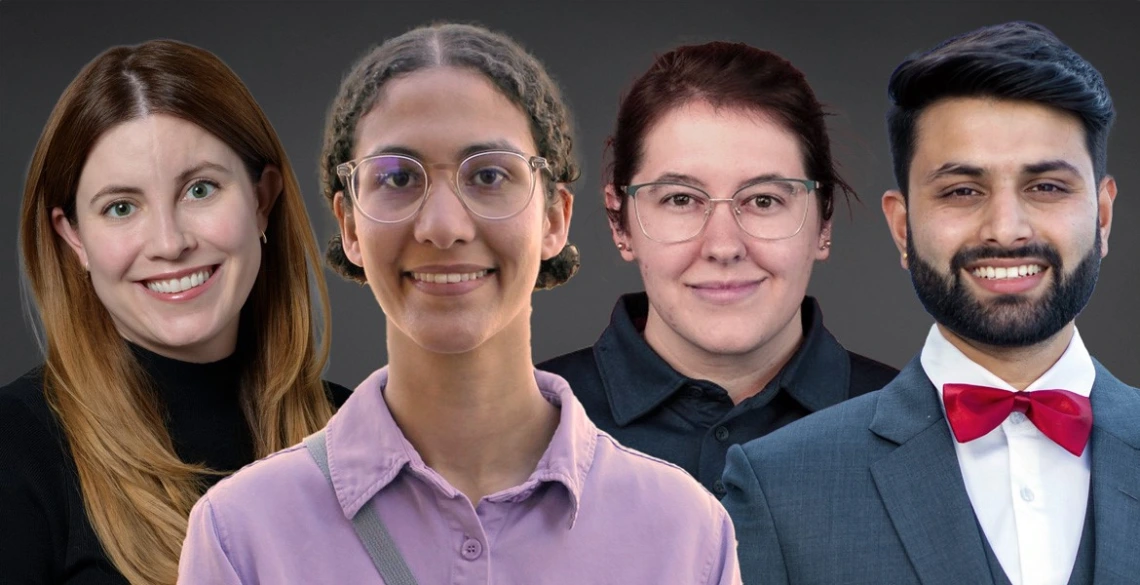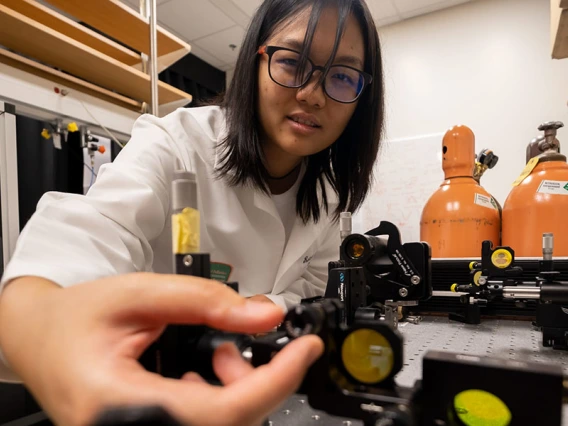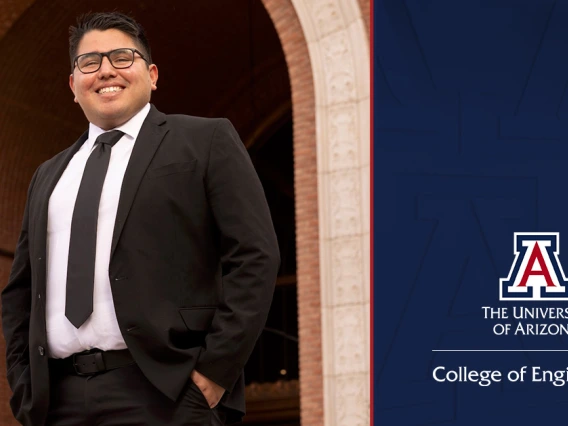Graduate Student Fellowships Boost Contributions to Life-Changing Research
Engineering fellows at the University of Arizona are pushing the limits in areas ranging from artificial intelligence and disease detection to hypersonic flight.

(From left) Kama Svoboda, Rhea Carlson, Avery White and Uddav Ghimire are among the engineering students receiving 2023-2024 graduate fellowships and advancing high-profile research at the University of Arizona.
Fellowships are key to graduate student involvement in breakthrough research at the University of Arizona in the College of Engineering.
“The recipients of our graduate fellowships are some of the most outstanding applicants to our graduate programs,” said Kelly Simmons-Potter, the college’s associate dean for academic affairs. “The ability to provide research fellowships to these students can be a critical factor that enables them to pursue their graduate educational and research goals, to the benefit of both their careers and the broader fields of engineering.”
Meet just a few talented engineering students who received fellowships in 2023-2024 and see the full list of fellows.
Human-Inspired Computing
University Fellow Kama Svoboda’s work in brain-inspired computing to advance AI is impressive on its own. And her objectives stretch well beyond the lab.
“As a research scientist, my goal is to be a positive role model and mentor, especially for other women in STEM,” said the electrical and computer engineering doctoral student.
Svoboda, who earned bachelor’s and master’s degrees in electrical engineering at UA, specializes in a type of artificial intelligence – called Spiking Neural Networks, or SNNs – that mimics the human brain.
“SNNs represent an exciting advancement in AI, offering a more brain-like approach to computing,” she said. “My research is focused on creating and optimizing biologically inspired neural networks in hardware. This makes them more efficient and capable of handling information in a way that is similar to how our brains process sensory data like sights and sounds.”
University Fellows make up a cohort of the highest-ranking incoming graduate students. The fellowships provide not only multiple-year financial support but also professional development and opportunities to collaborate with PhD students across disciplines.
“The fellowship itself has helped me identify and apply to sources for future funding and better communicate my research to lay people and those from other disciplines,” said Svoboda.
Tracking Brain Toxins
PhD biomedical engineering student Rhea Carlson is delving deep into how the brain works, too, but from a dramatically different perspective. The Herbold Fellow is contributing to imaging research aimed at diagnosing and treating brain disorders.
“This research has implications for understanding diseases that are characterized by the accumulation of proteins in the brain, such as Alzheimer’s Disease or Parkinson’s Disease,” said Carlson.
Using MRI, or magnetic resonance imaging, in the Multi-Scale Brain Imaging Lab, she is tracking the movement of molecular waste, a normal byproduct of neuron activity that can build up in the aging brain.
The lab is investigating possible connections between a slowdown in the recently discovered glymphatic system – thought to clear the naturally occurring waste as it moves cerebrospinal fluid through brain tissue and around blood vessels – and the buildup of toxic proteins that increase the risk of neurodegenerative diseases.
“I hope that it can help build the foundation to better understand these diseases,” said Carlson, one of five students at UA to receive an annual Herbold Fellowship.
Select universities across the country receive Herbold Fellowships for graduate students applying data science and computation in their studies and research.
Salty Solutions
Engineering Dean’s Fellow Uddav Ghimire dreamed of becoming a doctoral student in the United States from a young age. Hailing from Nepal, the civil and architectural engineering student’s research aspirations became a reality at the College of Engineering with multi-year funding from the Dean’s Fellowship.
Becoming a UA student has afforded more access to technology and resources including research funding, said Ghimire.
Ghimire is probing a relatively new area of research designed to understand how soil – altered by climate change – will impact infrastructure.
Climate change is known to cause extended flooding and droughts, which upsets water resources and increases the likelihood of soil salinization. Soil salinization – the accumulation of salt on top of soil – is widely considered a threat to arid land regions. High salt concentrations stunt plant growth and cause soil deterioration.
Ghimire is zeroing in on what this means for public works.
“In terms of geotechnical engineering, I’m asking how the strength of the soil increases or decreases and how that affects the dams and all the infrastructure that is built on the soil,” said Ghimire.
With the mentorship of adviser Tejo V. Bheemasetti, assistant professor of civil engineering and engineering mechanics, Ghimire is analyzing soil samples taken from an area in South Dakota with excessive salt deposits to answer some of those questions.
“Uddav is investigating the role of salinity on the behavior of soils and developing risk assessment tools that can be helpful to stakeholders including the Bureau of Land Management, NRCS and dam safety officers,” said Bheemasetti.
Hypersonic Aspirations
Every step PhD student Avery White has taken on her academic journey has propelled her toward a career with NASA.
Drawn to space for as long as she can remember, the Engineering Dean’s Fellow is in her first year as a graduate research assistant with the UA Computational Hypersonics and Nonequilibrium Laboratory, which investigates flow phenomena of hypersonic flight.
“This type of research takes fluid dynamics to the extremes,” said the Tucson native, who is analyzing fluid behavior in flight vehicles such as re-entry space capsules and ramjet engines.
As a UA aerospace engineering undergraduate, White did research for a NASA-funded project in the university’s ASTEROIDS Laboratory, worked as an Arizona Space Grant intern, and interned at Ames Research Center in California’s Silicon Valley.
“I am constantly learning new things, and the work I do for my lab doesn't feel like work,” said White, who is among five early PhD students receiving annual support from David W. Hahn, the Craige M. Berge Dean of the College of Engineering.
She is grateful not only for the stipend but also for the job and salary that came with the distinction.
“Not having to worry about how I'm going to pay tuition and not having to pick up another job outside of class has taken a huge weight off my shoulders,” she said.
23-24 Engineering Graduate Fellows
Herbold Fellowships
The Herbold Foundation provides scholarship funds for master’s and early career doctoral students studying engineering, computer science and data science at select universities throughout the United States. Robert J. (Bob) Herbold is president of The Herbold Foundation and former COO of Microsoft. Each year a handful of outstanding students at the UA receive significant funding in their first year of study.
- Rhea Carlson, biomedical engineering, PhD
- Muhtasim Chowdhury, electrical and computer engineering, MS
- Gabriel Geffen, civil and architectural engineering, PhD
- Chenyi Wang, electrical and computer engineering, PhD
Engineering Dean’s Fellowship Program
David W. Hahn, the Craig M. Berge Dean of the college, funds the Engineering Dean's Fellowship with the help of the Craig M. Berge Deanship along with donor support through the annual Dean's Fund for Excellence. The fellowships expand the college’s doctoral program by providing multi-year salary and stipends to exceptional early-career PhD students.
- Mehri Aghdamigargari, mining and geological engineering, PhD
- Hanieh Totonchi Asl, electrical and computer engineering, PhD
- Uddav Ghimire, civil and architectural engineering and mechanics, PhD
- Amra Rey Mendoza, biomedical engineering, PhD
- Jeb Shingler, chemical and environmental engineering, PhD
- Avery White, aerospace and mechanical engineering, PhD
Graduate College Fellowships
The UA Graduate College provides stipends for one year to high-achieving first-year engineering students. Graduate students from the United States are highly encouraged to apply for GCF funding.
- Madeline Dailey, materials science and engineering, PhD
- Sara Sezavar Dokhtfaroughi, electrical and computer engineering, PhD
- Emmanuel Ewuzie, aerospace and mechanical engineering, PhD



